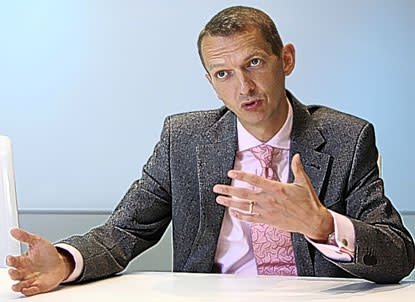Anthony Hilton: Central banks have a habit of ignoring dissent

The markets got very excited earlier this month when the minutes of the Bank of England’s monetary policy committee showed that three of its eight members wanted a rise in interest rates — a higher number than we have seen since well before the referendum.
The fact that the vote happened at what was scheduled to be the last meeting for one of the hawks, Kristin Forbes, merely added to the excitement. Would her replacement from the London School of Economics take a similar hard line?
Then there was even more excitement last week when another member, the Bank’s chief economist Andrew Haldane used a speech in Bradford to say he was coming round to a similar view. He acknowledged the continuing lack of wage growth, the uncertainties of Brexit and the fact inflationary pressures are building only very slowly.
But he also thought that the last nine months have seen a major improvement in the global situation, with many of the world’s regions — including the European Union — growing more strongly now than they have for some years. World trade is picking up, political risk is beginning to recede in other countries, if not here, people seem less concerned about deflation and stagnation and there are signs of a revival in investment.
All this has prompted him to think it might soon be time to act, and he hinted quite strongly that — in the absence of any major change in the underlying data — he will press at the autumn MPC meeting for at least a partial unwinding of the interest rate cuts put in place last June to mitigate the shock of the referendum vote.
Haldane is one of the long-time doves on the committee, someone who has long thought the economy was more fragile than the official figures seemed to suggest. His change of tone, therefore, is potentially more telling than had it been one of the other members. It also seemed to put him at odds with the views of Governor Mark Carney, also expressed last week and taken to favour no change. Hence the excitement in the markets.
But hot air and gossip, even when produced in industrial quantities, still does not guarantee that anything is likely to happen. Central bank watching is big business, because there are literally billions of pounds riding on shifts in interest rates, and fortunes await those who guess correctly.
Every City firm has its teams of economists who pore over every word in the minutes of meetings and in the speeches of policymakers in this country, at the Federal Reserve in Washington, at the Bank of Japan and the European Central Bank in Frankfurt. They are constantly on the look-out for a nuance here, a change of emphasis there — something or anything which might give them an edge.
History has shown, however, that it is largely a waste of resources because, for all the success bank watchers have, their firms might as well employ a monkey with a pin. It would be cheaper too as monkeys tend — some may say unfairly — to earn less than economists.
The interesting thing is that this month’s excitement ignores something which Fathom Consulting — another economics firm — recently pointed out. What they have not taken on board is that there is nothing in the data to show that an increase in a minority of members voting for a rate hike makes such a rise any more probable some time soon. It might be the case that in Hollywood films such as Twelve Angry Men one dissenter will eventually win round the other 11 jurors, but that is not the way to bet in real life.
Fathom has done the grunt work and says that since the MPC was formed 20 years ago there have been 40 identifiable and separate periods of dissent on the committee, but in only just over half the cases did the dissenters’ view eventually prevail. They tended to be better at persuading colleagues eventually to cut.
When the dissenters were agitating for a rate rise they were less successful, eventually obtaining their goal 40% of the time. This means, in fact, that the lobbying for a rise seen in the past few days makes it statistically less likely that anything will happen.
That is even more the case with the Federal Reserve, which sets the rates for the United States. According to Fathom there have been 25 cases of dissent in that committee in the relevant 20-year period, but the eventual success rate was only 15% — meaning the dissenter was more than five times as likely to give up or leave as to hold on and secure eventual success.
Now you might think that this makes the whole central bank-watching exercise pointless, but that would be to misunderstand markets. What actually matters is not what the MPC does, but what people think it is going to do. So if an action by a Forbes or Haldane prompts people to think rates are more likely to go up some time soon, then markets will not wait to see if that outcome is achieved but instead they will respond immediately. Dissent on the committee prompts a change in sentiment among market watchers, which creates a move in the markets.
The fact that the actual move may never happen does not matter. By the time that message sinks in, something else will have happened and the relevant people will have made their money and moved on.

 Yahoo Finance
Yahoo Finance 